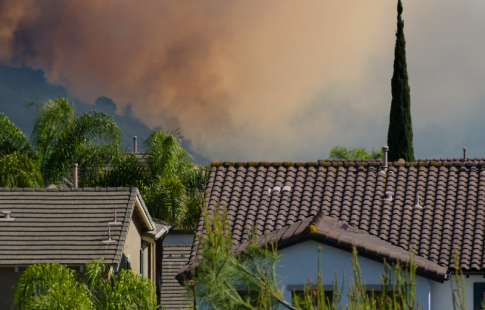It can be difficult to know where to start after a fire but experts point to a handful of critical first steps. Here is a summary of some top tips, followed by additional resources.
1. Take care of yourself
Your health and the health of your loved ones is the most important thing after a house fire. Contact a doctor or health specialist immediately if you have any of the following symptoms: persistent coughing, wheezing, vomiting, fever or elevated body temperature, or difficulty breathing. Any of these symptoms could indicate smoke inhalation problems.
Visit the CDC’s dedicated wildfires page for more recommendations, including tips on respirators and other safety equipment. You can also visit Airnow.gov for air quality updates.
2. Notify loved ones and key contacts
Notify friends and family on your emergency contact list. In addition to their emotional support, they may have resources available to assist you in the short term.
If your home was impacted by a major fire, texting and posting on social media may be the best way to reach out. As Ready.gov notes, “Phone systems are often busy following a disaster. Make calls only in emergencies.”
3. Contact your mortgage company
If you’re a Mr. Cooper customer, contact us as soon as possible to let us know your situation. We may be able to provide you with additional assistance. You can start the process online, or if you’re unable to, please call 833-685-2565. For more information, please visit our Disaster Relief page.
You can also access our chat feature for quick answers. Chat is available on our main website at www.mrcooper.com and in our Help Center.
4. Contact your insurance company and track expenses
Contact your insurance company to begin the claims process and to determine what emergency assistance you’re eligible for. We provide steps for filing insurance claims with your insurer and us here. Do not attempt to document damage until authorities tell you it is safe to do so.
Keep careful track of your expenses so that you can easily provide your insurance company with receipts for potential reimbursements, depending on your policy. Remember to include dates and times, and if you’re using a credit card, keep all of your receipts with each of your monthly statements.
5. Identify resources
Think of the things that you and your family need immediately and contact groups for assistance. These can include nonprofits, social service departments, your insurance provider, churches, local humane societies, and more.
Also check for helpful apps and ways to sign up for notifications from emergency organizations and state and local authorities.
6. Find temporary housing
Depending on what your insurance policy covers, you may need temporary housing at a hotel, a crisis shelter, or with family or friends. The Red Cross offers an online directory of disaster shelter locations, and services like 211 keep local information on hand.
In the event you do temporarily relocate, share your change of address with:
- The Postal Service
- Utility companies
- Your mortgage company and insurers
- Banks and credit card companies
- Your employer
- Your children’s schools and your neighbors
- Agencies you receive benefits from, such as the Social Security Administration
You can also contact your police department to let them know your home will be unoccupied.
7. Return home when authorities say it’s safe
This point can’t be emphasized enough. In addition to structural damage to your home, other safety issues can emerge after a fire—including to the roads you’re planning to travel.
Once access is granted, check with your fire department to ensure it’s safe to enter your house. Among other risks, “the ground may contain heat pockets that can burn you or spark another fire,” Ready.gov warns. Additionally, the U.S. Fire Administration cautions that the “soot and dirty water left behind may contain things that could make you sick.”
Additional resources
For more information on next steps, visit:
- Ready.gov’s Wildfires page
- The American Red Cross Guide to Fire Recovery
- U.S. Fire Administration’s “After the Fire” booklet
Any third party trademarks and tradenames used on the Mr. Cooper® Blog are the property of their respective owners. Nationstar Mortgage LLC d/b/a Mr. Cooper is not affiliated, associated, or sponsored by any of these owners. Use of these names and trademarks is not intended to and does not imply endorsement but is for identification purposes only. Information provided does not necessarily represent the views of Mr. Cooper. Information is subject to change without notice.







